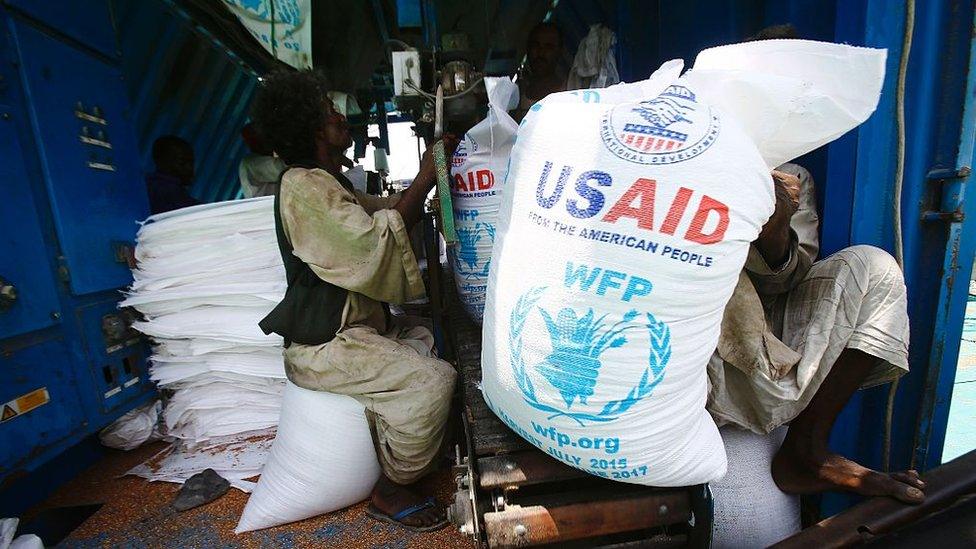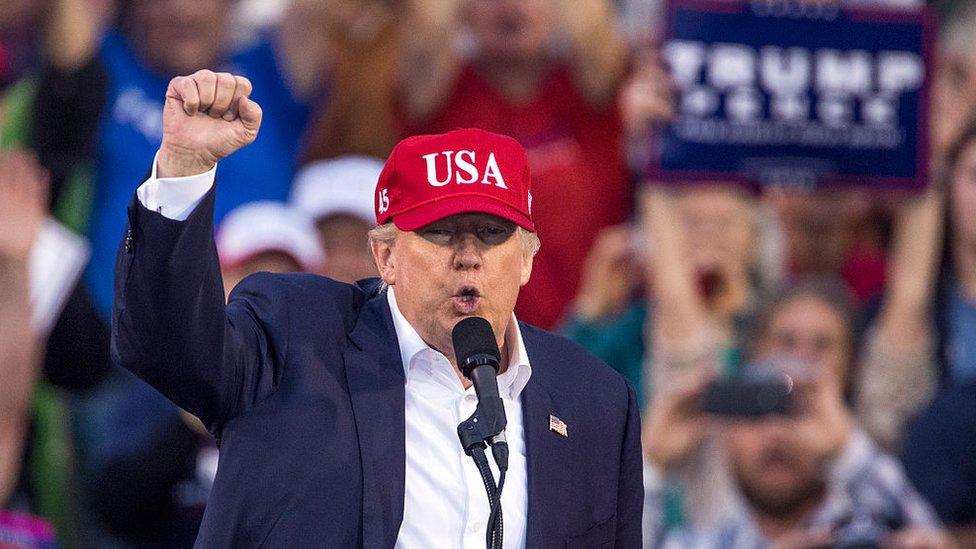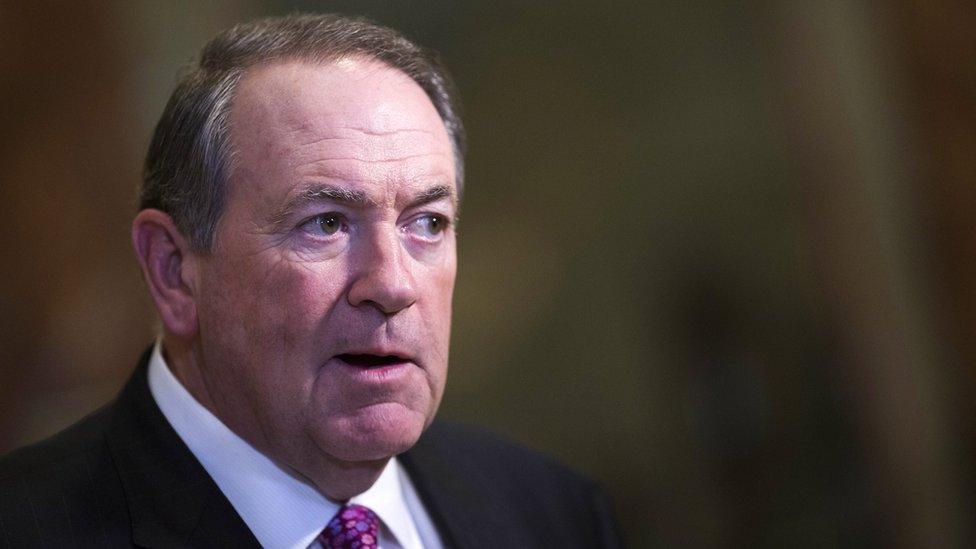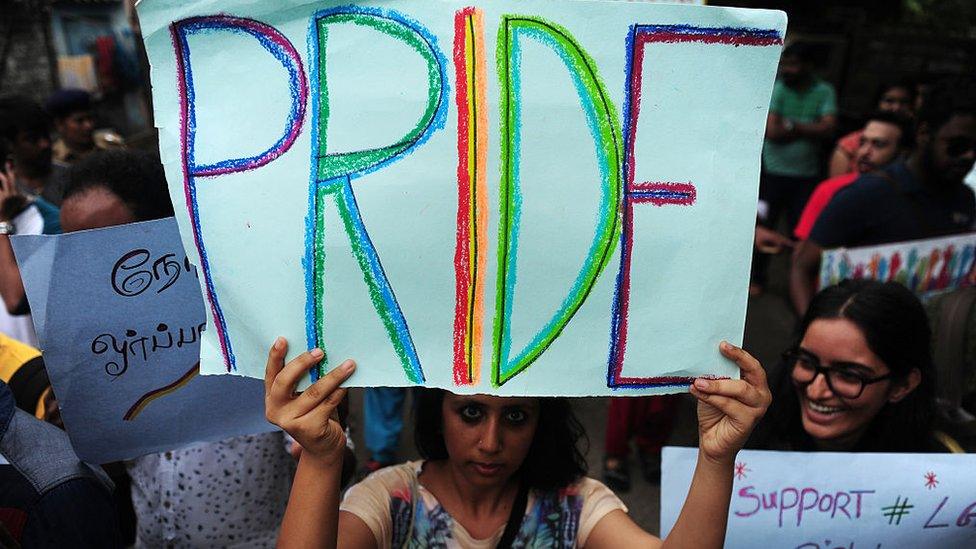Will Trump embrace the funding of overseas aid?
- Published

America is the biggest single donor of overseas aid in the world.
The US Agency for International Development (USAid) spent $31bn (£25bn) last year.
But like other areas of foreign policy, we can only speculate what a Trump administration will do.
Donald Trump's pronouncements so far on international aid are what you might expect from a proponent of the "America First" world view.
He told the 2016 Science Debate, external: "We cannot take our place as world leader if we are not healthy enough to take care of ourselves… A prosperous America is a much better partner in tackling global problems."
His twin argument is that America is giving too much money away to countries which are downright ungrateful.
He launched his presidential bid with a speech which included the line "we should stop foreign aid to countries that hate us., external"
He also told the Washington Post, external: "I watched as we built schools in Iraq and they'd be blown up. And we'd build another one and it would get blown up. And we would rebuild it three times. And yet we can't build a school in Brooklyn."

"America First" was a central tenet of Donald Trump's presidential election campaign
Perhaps it is no surprise then that USAid is one of those government agencies which has yet to hear from the Trump transition team.
Scott Morris from the Centre for Global Development in Washington says he is troubled already by these early signs, and by Trump's general attitude towards engaging with multilateral bodies.
He also thinks sizeable cuts in this area cannot be discounted.
"Trump could go for the foreign aid budget as a sacrificial lamb very early on - even though the dollars aren't huge," Mr Morris says.
"He could try to deliver something symbolic to show his supporters that he is getting tough and putting America first."
That said, there is strong tradition of bipartisan support for America's commitment helping the world's poorest.
Many Republicans on Capitol Hill may not like the idea of government largesse, but they will be the first to acknowledge that overseas aid makes up less than 1% of the federal budget.
The religious right, too, remains very supportive of humanitarian spending - particularly in global health.
Many evangelicals would agree with the homily of the former Republican Governor of Arkansas, Mike Huckabee, external, on this.
"As Americans we are enormously blessed to live in the greatest country on the globe, and, to whom much is given, much is expected," he said.

Mike Huckabee, former governor of Arkansas, says that "much is expected" of the US
Then there is the more pragmatic argument for aid spending - that it helps wins hearts and minds which can never be won by military power alone.
George W Bush's fiercest foreign policy critics argued that his military intervention in Iraq was disastrous for the region and severely damaged America's standing in the world.
But often those same critics are far more complimentary about his record in sub-Saharan Africa because of the HIV/Aids, external and malaria, external initiatives which he set up there.
Both of these projects were later adopted and built on by President Obama, who has described such aid as being "a key part of American foreign policy".
Following 9/11, there has been a growing recognition in the Pentagon that the "soft power" of overseas aid helps in the fight against extremism.
If America is seen to be indifferent to, say, the Ebola crisis or a huge earthquake, it can act as a recruiting sergeant for radical groups.
There are some signs that Mr Trump might be persuaded by this argument; that aid and security go hand-in-hand.
In April, he acknowledged on Fox News, external that "we do help countries that we're not in love with. But if we don't help them, there are going to be bigger problems."
Even if the aid budget stays intact, however, some fear Trump will radically change current priorities.
What about the family planning programmes overseas, for example?
Or projects which help protect the LGBT rights in countries with bad human rights records?
The head of the International Planned Parenthood Federation, Tewodros Melesse, has already warned the president-elect, external that he should not think of cutting funds for reproductive health in the developing world.

What attitude will the Trump administration take on LGBT rights?
The biggest question mark is whether America will still give money to the Green Climate Fund, external, which helps developing countries to get to grips with climate change.
George Ingram from the Washington-based Brookings Institution agrees that these environmental initiatives look the most vulnerable, but he thinks experts should start employing more creative strategies to persuade Trump.
"He has demonstrated an ability to shift very quickly when the right person presents the right issue to him in the right way," says Mr Ingram.
"So on climate change, for example, I might bring in the Navy to explain to him how they are dealing with the sea levels rising. I think there's a way to get to Trump on that issue."
Of course, much will also depend on what comes out of the new president's mouth on the tricky issues facing the world.
Will, for example, he still persist in claiming that Syrian refugee programmes are a "Trojan Horse" for terrorists, external?
America's outward-looking values on humanitarian issues are part of its leadership role in the world.
If the US becomes more isolationist, less generous to the world's poorest and less welcoming, it might end up damaging the more positive parts of its image - symbolised by Lady Liberty and her shining torch.
Other countries could then step in to fill that soft power vacuum.
If nothing else, as a competitive businessman, Mr Trump might find that diminution of a powerful global brand is rather concerning.